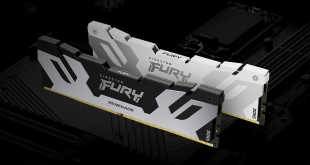One of the saddest things about the UK is the way this country has let it's manufacturing move to other parts of the world over the past 40 years. Where ‘Made in Great Britain' once carried the same kind of cache as ‘Made in West Germany', now most of the Brit-branded goods you see are actually Indian, German or <insert name of any other country here>. Japan has more will power it seems. KitGuru dons a belt with 1,000 stitches and looks toward the rising sun for wisdom.
Samsung makes a lot of memory. Tucked in behind Samsung is Hynix. We're not talking about the name you see on the packet when it's hanging in the store. We're talking about the actual nubbins of RAM that sit on the plasticky module things. These two companies have one thing in common. They are both Korean.
Meanwhile, exchanging places every couple of years, we have Elpida and Micron in 3rd and 4th place. While you can go to ‘Used to be a big name, but where are they now' manufacturers like Nanya for chips, the reality is that these four companies pwn most of the world's serious memory customers.
But they are not all the same. Elpida has something that the companies around it are often missing. Market leading technology.
While it might only be the 3rd or 4th biggest in the world, Elpida is a serious pioneer. Easter 2011, it started to pump out 30nm products in volume and on 22nd September 2011, it announced that it had cracked the 25nm process to create 4Gb DRAM. This move to a world-leading technology brought with it huge improvements in efficiency, with standby current usage dropping almost 50% and even ‘full speed use' current dropping by up to 30%. At the same time, the reduced package size means that Elpida can get 45% more memory out of its line. Perfect for UltraBooks, in terms of lower power consumption and price-per-module.
So who will step in for Elpida and it's world-leading production technology?
In any truly-free-market economy (like the UK), Samsung or Hynix would lead the charge. But, if you remember, the Japanese have a much stronger will and desire for independence and national glory. There's no way that the Japanese will allow Sakamoto to hand over control of its ‘jewel in the crown' memory company to the Koreans. Nope.
KitGuru believes that the Japanese government would happily provide financial/legal support to almost any other company/country, to ensure that Elpida (a) remains a going concern and (b) stays Japanese at its core.
First move? The Japanese government could encourage its banks to forgive Elpida around $500 million in loans.
Nice.

KitGuru says: Here's a thought for the day… Intel helped create a new memory company (Numonyx) and then sold its share to Micron (with some payment in shares – creating a long term link between the two organisations). Intel is trying everything it can to get Windows-based systems which can compete with Apple. Key to that attack is the UltraBook. Elpida's next generation memory technology could help Intel improve its designs in this area. Intel-guided investment into Elipda (possibly with Japanese government backing) could be attractive to everyone concerned.
Comment below or in the KitGuru forums.
 KitGuru KitGuru.net – Tech News | Hardware News | Hardware Reviews | IOS | Mobile | Gaming | Graphics Cards
KitGuru KitGuru.net – Tech News | Hardware News | Hardware Reviews | IOS | Mobile | Gaming | Graphics Cards


